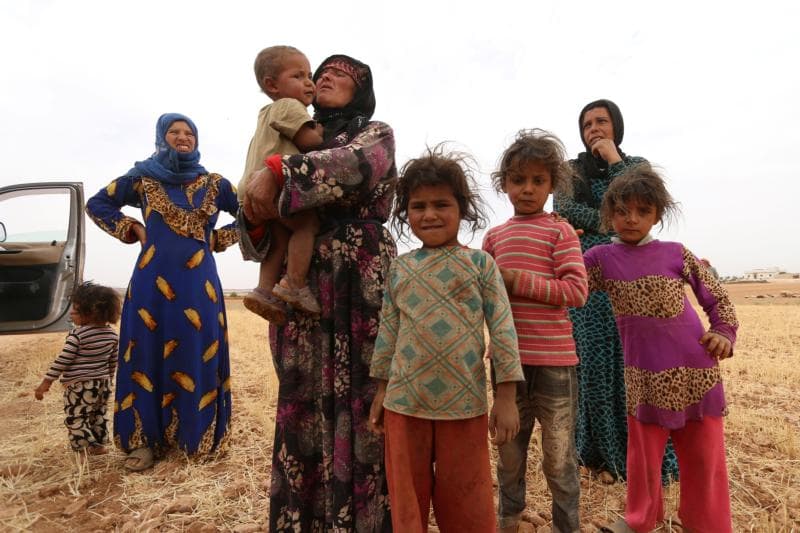ROSARIO, Argentina — Despite the “raging pandemic,” and the multitude of contradictions and trials the world faces today, Christmas is still a season of hope and rejoice, according to the archbishop of war-torn Aleppo, in Syria.
“The light of this feast as well as the luster of the memory are darkened by the return of the raging pandemic, which makes a great number of people saddened by infections of the virus, here and everywhere, in a world weakened by a multitude of contradictions and trials of all kinds,” says the Christmas message of Archbishop Jean-Clement Jeanbart, metropolitan of Aleppo.
“In fact, with an unprecedented pandemic and a painful social crisis, the family is attacked in its very foundations and children to be born find themselves threatened,” he wrote.
Christmas this year, he wrote, coincides with the 25th anniversary of his episcopal ordination.
Speaking about the situation in Syria, after a decade-long armed conflict, Cardinal Mario Zenari, papal representative in the country, told Crux that despite the war being seemingly over, there are several “bombs” still going off in the nation, including that of extreme poverty and an exodus of the brightest minds to other nations.
“I saw this very terrible, very bloody conflict every day,” Zenari said. “We had very difficult moments, with bombs falling all over Syria, here in the capital mostly rockets and mortars.”
Despite that violence being over, poverty today affects 83 percent of the population, and over 12 million people have had to flee their homes and are living either as refugees or internally displaced persons. Aleppo is no exception, and in a city where winter temperatures can reach below freezing at night, and people waiting in long lines for hours to buy bread and fuel, the concept of a “different” Christmas takes a whole new meaning.
Yet, according to Jeanbart, “Christmas is there to remind us that man is no longer alone. A Savior is born to us and he lives among us! He is the all-powerful Son of the Most High.”
God, the prelate wrote, will not leave his children orphaned or bereft.
“Hasn’t the moment come for the Christian to shake off the torpor of his faith and to stand up and orient himself toward Him, to humbly seek him, full of joy like the shepherds, confident and full of respect like the three kings?” Jeanbart wrote.
The United Nations Security Council, which met last week to discuss the nation’s humanitarian crisis, estimates that COVID-19 cases have more than quadrupled in October and November compared to August and September.
Cities devastated by war, have a kneecapped health system that can barely handle the country’s basic needs, with hundreds of thousands suffering the scars of conflict. The COVID-19 pandemic further strains a health system on the brink of collapsing: By 2018, an estimated 60 percent of public hospitals in the country were shut down, mostly after being bombed, so re-opening them is a long-term goal. At least 650 health-care workers had been killed in the war, and half of the surviving doctors and nurses have emigrated.
In 2018, at the urging of Zenari, a coalition of bishops conferences- Italy, U.S., Spain and Germany – and Catholic NGO’s, and with the support of the Vatican’s Dicastery for Integral Human Development began investing millions of dollars to have re-open Catholic hospitals in Syria. Two hospitals re-opened in Damascus and one in Aleppo.
In September, Father Ibrahim Alsabagh, the parish priest of the Latin Parish in Aleppo, told Crux that due to the precariousness and lack of medical infrastructure, the coronavirus was all the more deadly in his “rubble city.” In fact, two out of five friars living with him died from COVID-19.
Last week, heads of the local churches present in Syria and Iraq, together with Catholic NGOs and development agencies had an online gathering to discuss the situation in these two Middle Eastern countries.
Though the summit was private, the head of the papal charity Caritas Internationalis told Crux that the 10th year mark of the bloody violence in Syria is a “symbolic moment to say: Stop the suffering of the people.”
“Suggestions were put on the table to this end, and it was also made clear that the unilateral sanctions do not serve their purpose, and they need to be removed,” said Aloysious John. “All of us need to contribute so that these sanctions are removed.”
Despite the many challenges, Jeanbart insists in his Christmas message that this is a season to address a song of glory to Jesus and ask the Virgin Mary and St. Joseph to protect children.
“Christ Jesus is our Hope and with Him we can do anything,” Jeanbart wrote.
Follow Inés San Martín on Twitter: @inesanma














